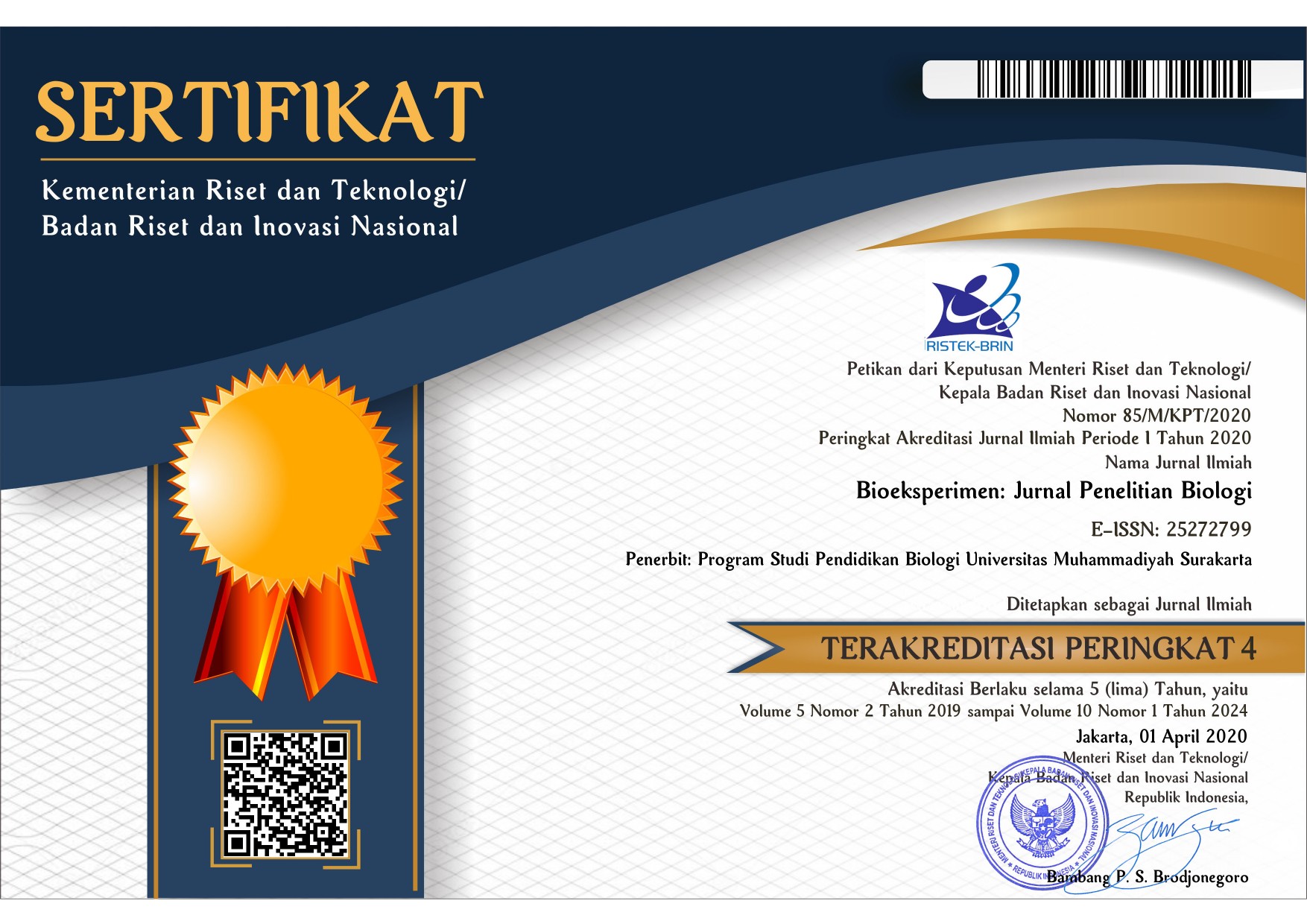Studi Penerapan Bank Sampah dalam Upaya Pengelolaan Lingkungan Hidup di Kota Yogyakarta
Sri Haryanti(1*), Evi Gravitiani(2), Mahendra Wijaya(3)(1)
(2) Dosen Program Studi Ilmu Lingkungan, Program Pasca Sarjana, UNS
(3) Dosen Program Studi Ilmu Sosiologi, Fakultas Ilmu Sosial dan Politik, UNS
(*) Corresponding Author
Abstract
Keywords
Full Text:
PDF (Bahasa Indonesia)References
Badan Pusat Statistik Daerah Istimewa Yogyakarta (Online) https://yogyakarta.bps.go.id/linkTabelStatis/view/id/70 diakses tanggal 31 Maret 2017
Bello et al (2016). Solid Waste Management in Africa: A Review.International Journal of Waste Resources.Vol.6 Issue 2
Damanhuri, E . dan Padmi, T. (2010). Pengelolaan sampah. Diktat Kuliah. Program Studi Teknik Lingkungan Fakultas Teknik Sipil dan Lingkungan Institut Teknologi Bandung.
Ejaz, N. Janjua, M.S.(2012).“Solid Waste Management Issue in Small Towns of Developing World: A Case Study of Taxila City,” International Journal of Environmental Science and Development, vol. 3, no. 2, April 2012.
Juliandoni,Asdriyani..(2013).Pelaksanaan Bank Sampah dalam Sistem Pengelolaan Sampah di Kelurahan di Balikpapan Gunung Bahagia [Online]. Tersedia pada: ejournal.umm.ac.id. Diakses 11 Mei 2017.
Kementrian Lingkungan Hidup. 2012. Peraturan Menteri Negara Lingkungan Hidup Republik Indonesia Nomor 13 Tahun 2012 Tentang Pedoman Pelaksanaan Reduce, Reuse, Dan Recycle Melalui Bank Sampah [Online]. Tersedia pada: http://download.portalgaruda.org. Diakses 10 Mei 2017.
Levi P, A.A.(2012). Gerakan Keadilan Lingkungan studi kasus Bank Sampah Gemah Ripah Dusun Badegan Bantul (online) http//eprints.uny.ac.id. Diakses 10 Mei 2017
Leton T, Omotosho O (2004) Landfill operations in the Niger delta region of Nigeria. Eng Geol 73: 171-177
Meidiana, C and Gamse,T .(2011). “The new law: Challenging opportunity for FUTURE Landfill operation in Indonesia,” Waste Management Research Journal. , SAGE Publishing, pp. 20-29, vol. 29, no.1, 2011.
Morrissey, A. J, & Browne, J. (2004). Waste management models and their application to sustainable waste management. Waste management Journal, 24, 297–308.http://dx.doi.org/10.1016/j.wasman.2003.09.005
Muntazah, Shofiyatul (n.d), Pengelolaan Bank Sampah Sebagai Upaya Pemberdayaan Masyarakat Di Bank Sampah Bintang Mangrove Kelurahan Gunung Anyar Tambak Kecamatan Gunung Anyar Surabaya (Online) (http://ejournal.unesa.ac.id/index.php/jurnal-pendidikan-luar-sekolah/article/view diakses tanggal 28 Desember 2016)
Pratama, A.R,. Ihsan, M.I., (2017) Studi Kasus : Bank Sampah Malang, Jurnal Teknologi Lingkungan Vol. 18, No1, Januari 2017, 112-119
Purba, D.H., Meidiana,C., & Ardianto,W. (2014). Waste Management Scenario through Community Based Waste Bank: A Case Study of Kepanjen District, Malang Regency, Indonesia. International Journal of Environmental Science and Development. Vol. 5, No. 2, April 2014
Radityaningrum, A.D., Caroline,J., & Restianti, D.K.,(2017). Potensi Reduce, Reuse dan Recycle (3R) sampah pada Bank Sampah Bank Junk For Surabaya Clean (BJSC), Jukung Jurnal Teknik Lingkungan, 3 (1): 1-11, 2017
Shentika, P.A. (2016). Pengelolaan Bank Sampah di Kota Probolinggo (Online). JESP-Vol. 8, No 1 Maret 2016, ISSN (P) 2086-1575 E-ISSN 2502-7115, http://journal.um.ac.id/index.php/jesp/article/view/5971/diakses 25 Desember 2016)
Suryani, A.S, 2014, Peran Bank Sampah dalam Pengelolaan Sampah, JUrnal DPR RI Volume 5 (1), 71-74 Peluang Penguatan Bank Sampah untuk Mengurangi Timbulan Sampah Perkotaan
Suwerda, B.(2012). Bank Sampah (Kajian Teori dan Penerapan), Yogyakarta: Pustaka Rihana, 2012.
Ulfah, N.A., Normelani, E. dan Arisanty, D. (2016). Studi Efektifitas Bank sampah sebagai Salah Satu Pendekatan dalam pengelolaan sampah Tingkat Sekolah Menengah Atas (SMA) di Banjarmasin. Jurnal Pendidikan Geografi (JPG), 3 (5),22-37
Undang-Undang No. 18 tahun 2008 tentang Pengelolaan Sampah
Unilever, 2013. Buku panduan Sistem Bank Sampah dan 10 Kisah Sukses. Jurnal Online. Tersedia di (www.unilever.co.id) di akses 09 Mei 2017
Article Metrics
Abstract view(s): 6734 time(s)PDF (Bahasa Indonesia): 8071 time(s)
Refbacks
- There are currently no refbacks.








